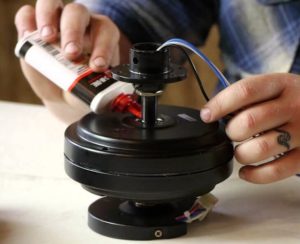Being aware of our surroundings and any changes that occur is important in detecting potential threats and issues. Just as we would be concerned if our car starts making unfamiliar sounds or if our lights begin flickering regularly, it is understandable to feel concerned if our ceiling fan starts making noise.
In general, a slightly noisy fan is not necessarily a problem, especially if it has always been that way. However, if the noise is new or unusual, it could be a cause for concern. It is important to pay attention to any changes in the fan’s noise level and address them instantly to ensure its proper functioning and to prevent any issues.
Ceiling fans typically produce some level of noise, which is considered normal. However, if you notice new, louder, or unusual noises coming from your ceiling fan, it could indicate underlying issues. It is important to be aware of additional warning signs that may accompany the noise, such as heat, smoke, ceiling cracks, faulty operation, or creaking wood. While most noises from a ceiling fan, except for electrical hums or pops, are not immediately dangerous, they should not be ignored.
Why Are Some Ceiling Fans Noisy?
The noise level of ceiling fans can vary depending on the brand, model, and design.
While some fans are designed to be quieter than others, it’s possible to check a fan’s noise rating before purchasing to ensure it meets your preference for a quiet operation. DC ceiling fans, in particular, are known to operate with minimal motor-related noise compared to AC ceiling fans.
In general, it is normal to expect a certain level of constant and consistent noise while a ceiling fan is spinning. This is primarily caused by the motor that spins the fan and the slight friction generated by the rotation. However, if you notice unusual or intermittent buzzing, humming, clicking, grinding, or popping sounds coming from your fan, it is a cause for concern. These types of noises are not normal and are typically indicators of underlying issues.
For instance, if you have an unbalanced fan, it may produce noise due to wobbling, or a fan in need of lubrication may create additional noise due to increased friction.
Loud Ceiling Fans Are Not Inherently Dangerous
Loud ceiling fans, even though they may be annoying, are generally not inherently dangerous. This is especially true if the fan is not explicitly designed to operate at a low noise level.
Unless you have recently purchased a new fan that is specifically marketed as a silent or low-noise fan, audible operating noise is not typically a cause for concern.
However, if your fan suddenly becomes significantly louder than before, starts making new and unusual noises, or produces sounds that are uncommon for a fan, it is likely indicative of a problem, and you should investigate the cause.
While these noises may not pose an immediate danger, they do suggest that there is an issue with your fan that requires attention and repair.
How to Know Whether the Noise Presents Danger?
While many noises coming from a ceiling fan are harmless, it is important to recognize that not all noises can be avoided. There is a possibility that the unusual noises from your fan could be indicative of a dangerous problem.
Before we move to the possible dangers caused by noisy ceiling fans, here are some signs that may associate the sounds and which would be a signal of definite issues:
- Smoke
- Creaking wood
- Intermittent functioning
- Extreme heat from the motor
- Cracks in the ceiling around the fan
- Flickering lights
As mentioned earlier, when it comes to noises from your ceiling fan, certain characteristics can indicate whether the sound has crossed the line from normal to problematic.
Potential Dangers Associated with Ceiling Fan Noise
It is advisable to cover all the necessary steps and check for potentially dangerous causes before deciding whether a more comprehensive inspection and repair can be delayed.
When your fan is showing problematic behavior, it is important to address the following issues covered in this article as early as possible to minimize the risk of injury and avoid immediate danger.
Noisy Ceiling Fans Could Be Loose in Their Mount
If your ceiling fan is loose in its mount, it can lead to the fan wobbling while in operation, causing the noise.
This situation poses a significant danger because a loose fan has the potential to come undone and fall onto the floor, resulting in damage to the fan, furniture beneath it, and, worst-case scenario, causing injury to individuals in its proximity.
If your fan is newly installed and wobbling due to being loose, it is likely not correctly installed.
On the other hand, if your fan is not new, regular wear and tear may have caused it to become unbalanced. In most cases, realigning and reinforcing the fan can resolve the issue.
However, complications can arise if there are underlying problems such as rotting ceiling joists, which may require additional measures to address.
Some Noises Indicate Electrical Problems
If you hear hissing, humming, or popping noises coming from your ceiling fan, it could indicate an issue with the electrical wiring within the fan.
Dealing with electrical wiring problems should not be attempted unless you have significant experience with electrical work. Working with electricity can be dangerous, and the risk of electrical shock should not be taken lightly.
If you decide to inspect the wiring yourself, it is essential to ensure your safety by shutting off the breaker and the wall switch that controls the fan.
If the electrical problem is not addressed, there is a risk of an electrical fire starting. Electrical fires can be challenging to extinguish, and it is best to avoid such a situation from occurring on your ceiling.
Loose Blades Can Be Dangerous
In some cases, it may not be the entire fan that is loose at the mount but rather the individual blades that are moving within their brackets.
While the blades are smaller components, they can still pose a risk if a blade were to fall or detach from the fan while it is operating at high speed.
When inspecting your blades, it is important to determine if they are truly loose or if they have simply become unbalanced. Unbalanced blades can often be fixed easily by adding weight to the top of the unbalanced blades, such as gluing coins. Alternatively, you can use inexpensive balancing kits.
If the blades are genuinely loose, you should re-tightened them. Check both the points where the blades attach to the brackets and the brackets themselves for any signs of wobbling.
If any of the screws or bolts used to hold the blades in place are stripped or ill-fitting, you should replace them with suitable replacements.
The Light Fixture Might Be Loose
Another potential cause of strange noises in your ceiling fan could be the light fixture. If any part of the fixture is loose, it can result in rattling or vibrating sounds during operation.
It’s important to address this issue as loose components of the light fixture can pose risks. If a light fixture cover, typically made from glass or ceramic, were to fall, it could break into small, sharp shards that could be hazardous.
Additionally, loose wiring inside the light fixture can lead to electrical issues, including the risk of electric shock or electrical fires.
If there is a loose part on the fixture, you can fix it all by yourself. Before you start working to fix it, ensure the power to the fan is turned off by switching off the breaker and the switch dedicated to the fan.
Ignoring the Fan’s Noises Can Lead to Problems
While fan noises can cause anxiety, they are generally not immediately dangerous. Even severe problems like wobbly parts are unlikely to cause a sudden collapse if they have only recently become loose. Yet, that should not be an excuse to neglect maintenance.
Neglecting a problem will only lead you to its worsening and increased danger over time. Even minor issues, initially posing no immediate threat, can escalate and become hazardous if left unattended. Continued usage will only exacerbate the damage to your fan.
While it may not be necessary to drop everything and address your fan issue immediately or get professional help, it is important to have it inspected at the earliest opportunity. In the meantime, it is advisable to refrain from using the fan to avoid making the problem worse.
Notably, when a fan produces unusual sounds at its highest speeds, it indicates that a problem has emerged. If these sounds persist even at lower settings, it suggests that the issue has worsened over time.


